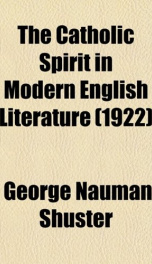the catholic spirit in modern english literature

Purchase of this book includes free trial access to www.million-books.com where you can read more than a million books for free. This is an OCR edition with typos. Excerpt from book: CHAPTER THREE THE PERSONALITY OF NEWMAN "I also in all things please all men, not seeking that which is profitable to myself, but to many, that they may be saved." Saint Paul. THE upheaval of the sixteenth century bequeathed to the world that would embattle the Catholic Spirit a two-edged sword: one, the humanistic elevation of nature and consequent debasement of the supernatural; the other, the astringent, menacingly ascetic outlook of the Puritan. It was against the second of these that Kenelm Digby, poetic and eruditely romantic, lifted an unwieldy voice, even though the matter he dealt with was the comparatively definite and simple life of the past. Then there arose from the midst of the thinkers of Protestant England a man whose powers were resolutely devoted to conquering the first enemy and the future it seemed destined to rule; who would read the scrolls of the final atheistic laughter at God and write over them a palimpsest of Christian confidence; who would attempt to fathom the dark and complex soul of all time and set down his findings with the clearness of a logbook. Again, as the human embryo is said to mirror the growth of the race, so John Henry Newman, triumphing over modern thought by the victory gained within himself, hasseemed to many a symbol of the intellectual development through which religiously unsettled moderns may have to pass. There is little reason why we should insist here upon the greatness of Newman's influence. A dozen gifted minds have confirmed Disraeli's opinion that he was the most powerful religious thinker to appear in England during several centuries; and we have only to consider the amazing betterment in the position of English Catholicism during the last generation to realize how much, even in an outward way, was accomplish...
Info about the book
Author:
Series:
Unknown
ISBN:
1595250271
Rating:
4.5/5 (4)Your rating:
0/5
Languge:
English
Users who have this book
Users who want this book
What readers are saying
What do you think? Write your own comment on this book!
write a commentGenre
if you like the catholic spirit in modern english literature try:
Other books by this author
Do you want to read a book that interests you? It’s EASY!
Create an account and send a request for reading to other users on the Webpage of the book!


